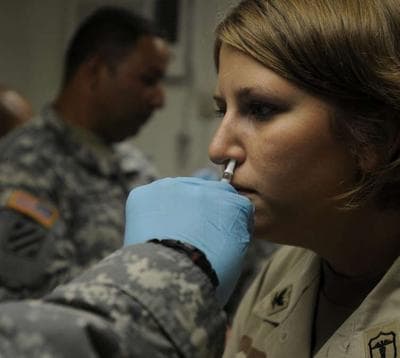Advertisement
West Nile And Plague Headlines Are Scary, But Flu Kills Many More

Dr. Ben Kruskal, chief of infectious diseases at Harvard Vanguard Medical Associates, sometimes feels like a broken record: Get a flu vaccine. Stay home if you’re sick. Wash your hands.
So he’s offering a creative angle this year: Comparing the potentially fatal infectious diseases that have been grabbing headlines lately — Bubonic plague, West Nile Virus and Eastern Equine Encephalitis — with the death toll from the plain old flu.
[module align="right" width="half" type="pull-quote"]The national toll from flu is at least a hundred-fold greater.[/module]
The high-risk groups tend to overlap: With both flu and West Nile Virus, it tends to be the very young, the very old and people with underlying medical conditions who die. And here’s the order of magnitude: The national toll from flu is at least a hundred-fold greater.
“If you look numerically,” he said, “the number of people who’ve died of West Nile Virus so far this year is around 100 versus 36,000 a year for flu.”
And though news reports tend to include mosquito-fighting advice, there’s actually more you can do to prevent flu, Dr. Kruskal points out. Even if you got a flu vaccine last year, you need a new one this year to boost it, he said, and while it’s all right to get it now, he recommends waiting until October or November to maximize your immunity, with Dec. 1 as a suggested deadline.
Our conversation, distilled and edited.
Dr. Kruskal: There’s been a lot of media attention to infections lately — the term of art that is used these days is “emerging infections,” things that are new or newly more frequent. The plague is probably not any different than usual; there are usually several cases of plague each year in the United States. So the fact that there have been a few this year is not really a surprise.
The flip side is West Nile, which is clearly increasing. One of the issues with infections that are hard to diagnose or unfamiliar so they don’t often get diagnosed is the question of “ascertainment bias,” the idea that when we start looking more aggressively, we find more. But with West Nile Virus, it seems clear we really are seeing more cases because there are more cases.
We don’t totally understand why that is, but it’s one of a number of different infections where there are changing conditions. All organisms are constantly changing and to expect them to stay the same is naive from an ecological point of view.
Triple-E is probably more like plague: There may be a few more cases this year but I think, again, it’s one of these things that the cases are dramatic when they occur so we pay attention to them, but I don’t think there’s a lot more triple-E than in the past.
So it’s the eternal problem that the media cover “Man bites dog” cases — the unexpected or unusual…
Yes, the contrast with all these things is that we see a few cases of triple-E and plague and get all worried about them when we have tens of thousands of deaths from common ordinary flu. I feel a little like a broken record talking about this but it is in fact a really important thing, and we actually have some ability to have an impact.
So what should we do this year? What are our marching orders?
What we should do this year are the same things we should have been doing every year: Get the vaccine. Stay home when you’re sick. Clean your hands with soap and water or alcohol-based disinfectant hand rub.
I have to confess: School started a few days ago and I had forgotten to have my kids wash their hands first thing when they get home. And now half the family has a nasty cold. What’s the deal on vaccines — do you need a new one if you got one last year?
Yes, even when it’s the same strains, we do need boosting annually.
I see signs for the vaccines all over the place already. Should we get them already?
The data on the duration of the flu vaccine are not conclusive and I would personally rather see people get immunized mostly in October and November. But if it’s a question of now or no vaccine, I’d rather they get immunized in September. All other things being equal, I’d rather wait a little, especially for people with the poorest immune response, who are most at risk of the immunity wearing off early. But in general I’d say it’s not terrible to get your shot in September, though it’s probably better to get it in October or November.
Below: A Harvard Vanguard video Q&A with Dr. Kruskal about the flu vaccine.
This program aired on September 19, 2012. The audio for this program is not available.

